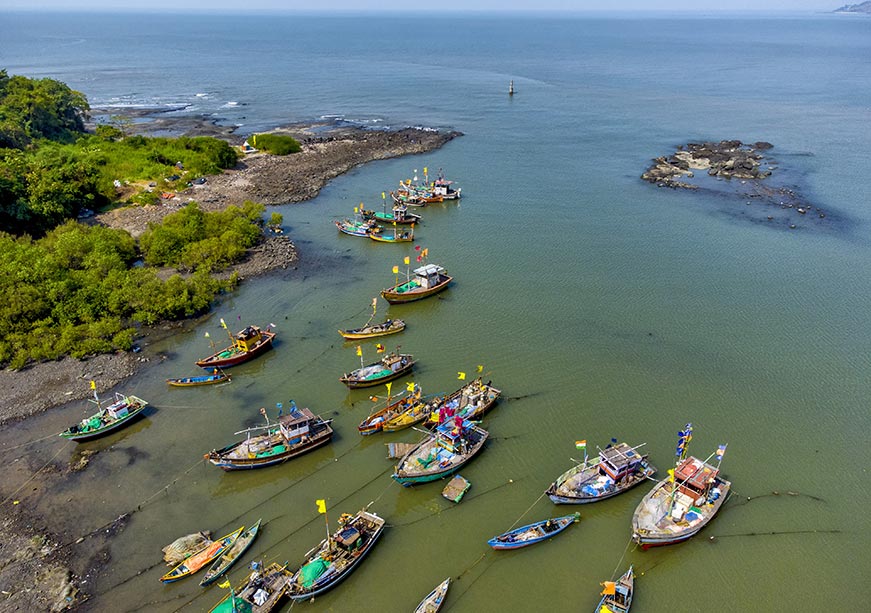-
CENTRES
Progammes & Centres
Location
Maritime governance must centre coastal communities; South Africa has taken crucial steps towards addressing the challenges faced by these communities

Image Source: Getty
This article is part of the essay series “Sagarmanthan Edit 2024”
Coastal communities are integral to the global maritime ecosystem, as both the stewards and primary beneficiaries of oceanic resources. In South Africa, such communities, especially in rural regions like the Western and Eastern Cape, depend on the oceans for their livelihoods, cultural heritage and resilience against environmental changes. However, these coastal communities increasingly face challenges from climate change, pollution and marginalising governance policies. As coastal communities worldwide face environmental and socio-economic challenges, maritime governance must evolve to address these issues sustainably.
To achieve effective governance frameworks, it is essential to strike a balance between ecological, economic and social aspects, integrating community voices, indigenous knowledge, technology and adaptive policies.
To achieve effective governance frameworks, it is essential to strike a balance between ecological, economic and social aspects, integrating community voices, indigenous knowledge, technology and adaptive policies. This commentary, integrating ecological, social, and economic elements, explores how inclusive maritime governance can support sustainable development goals, enhance resilience in coastal communities, and effectively manage marine resources.
South Africa’s maritime industry plays a critical role in supporting the livelihood of coastal communities through fishing, eco-tourism, small-scale fisheries, and aquaculture. These sectors not only provide economic benefits but also play a crucial role in food security and cultural identity. However, these sectors are under significant pressure from environmental degradation, overfishing and evolving socio-economic demands. Adopting a people-centred approach to maritime governance is essential for addressing the social and economic needs of coastal populations while protecting marine ecosystems. Key policies, like the small-scale fisheries policy, were developed to address these challenges by formalising small-scale fishers' rights, particularly within rural coastal regions. This policy reflects a people-centred approach that integrates sustainable practices with community involvement, helping secure livelihoods while conserving marine ecosystems.
South Africa’s maritime industry plays a critical role in supporting the livelihood of coastal communities through fishing, eco-tourism, small-scale fisheries, and aquaculture.
In addition to policy support, initiatives such as the Agulhas Biodiversity Initiative (ABI), which promotes ecotourism and sustainable agriculture, and the Wild Coast Project, which integrates community voices in managing protected areas, illustrate South Africa’s commitment to balancing conservation and economic needs. These initiatives showcase participatory governance models that align with South Africa’s broader goals for a sustainable blue economy.
Inclusive governance in South Africa’s coastal communities faces socio-economic, technological, and political barriers. Limited resources and digital infrastructure restrict participation, leaving many marginalised groups excluded. Cultural differences and inadequate representation further complicate engagement, especially when local knowledge is overlooked. Addressing these challenges requires targeted support through funding, capacity-building, and policies prioritising all stakeholders' voices in maritime governance.
Emerging technologies can significantly enhance governance, particularly in rural settings with limited access. South Africa’s ABALOBI[1] app empowers small-scale fishers by enabling digital catch documentation, transparent market access, and enhanced supply chain management. Initially introduced in Western Cape fisheries, this app ensures rural communities can engage in sustainable practices without the need for costly infrastructure, supporting both environmental goals and economic resilience.
Economic diversification is essential for resilience, especially in rural areas dependent on fishing. The Agulhas Biodiversity Initiative supports alternative income sources, such as ecotourism, small-scale farming and artisanal industries, reducing the reliance on marine resources and promoting conservation-friendly livelihoods. Such initiatives empower communities through training and financial support, enabling economic stability and aligning with sustainable development goals.
The Agulhas Biodiversity Initiative supports alternative income sources, such as ecotourism, small-scale farming and artisanal industries, reducing the reliance on marine resources and promoting conservation-friendly livelihoods.
Inclusive decision-making is vital for effective governance. In South Africa, the Wild Coast Project illustrates this through community partnerships with non-governmental organizations (NGO) and government agencies in the Eastern Cape. This project prioritises local voices in the management of protected areas, creating trust through shared ownership of marine resources. Such participatory governance models enable policies that reflect local knowledge and cultural values, promoting long-term ecological and community resilience. Governance policies can further empower these communities by providing access to training and financing, enabling more sustainable and diversified income sources that align with conservation goals.
South Africa’s coastal communities are increasingly vulnerable to climate impacts such as rising sea levels and coastal erosion. Programmes like Working for Ecosystems (WfE) and Ecosystem-based Adaptation (EbA) enhance resilience by restoring ecosystems and supporting sustainable resource use. The WfE programme, which is part of the Expanded Public Works Programme (EPWP), engages communities in activities like reforestation and wetland rehabilitation, while EbA strategies integrate local knowledge with conservation to mitigate climate impact and build adaptive capacity.
Developing an inclusive maritime governance framework that prioritises coastal communities requires a comprehensive and integrated approach, combining advanced technologies, active local engagement, economic diversification, and adaptive strategies to address climate change. Implementing accessible technologies, fostering participatory governance, and enhancing capacity-building are essential for building and strengthening the resilience of coastal communities, while ensuring the sustainable management of marine resources. By embedding these principles into governance policies, South Africa can foster a sustainable blue economy that promotes social equity and environmental stewardship, enhancing the overall well-being of coastal communities.
Weliswa Matekenya is a Senior Lecturer in Economics at Nelson Mandela University (NMU)
[1] ABALOBI is Xhosa name for Fisherman
The views expressed above belong to the author(s). ORF research and analyses now available on Telegram! Click here to access our curated content — blogs, longforms and interviews.

Matekenya holds a PhD in the Department of Economics from Nelson Mandela University (NMU). Her research interests include Maritime Economics, Development Economics, Environmental Economics, Public ...
Read More +